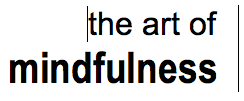people ask:
I heard there is a religious basis to mindfulness. Is this true?
Mindfulness practice has been a feature of most of the main spiritual traditions in the East and It is practised in Buddhism. Dr. Jon Kabat-Zinn brought mindfulness to the West and subjected it to the scrutiny of the scientific method. Because it is so effective in reducing stress, eliciting the relaxation response, lowering blood pressure, creating greater mental and physical health (and a raft of other verifiable advantages) it became very popular and gained access into the mainstream in the areas of health, education and business. I teach it as atool for well being, because, like eating well and exercising the body, it is a very sensible thing to do to support one's physical, emotional, mental and spiritual health.
I have trouble sitting cross-legged on the floor. Is that a problem in the mindfulness retreats, classes or 1:1 session you offer?
No, more often people sit on chairs in classes. At retreats there is always the option to sit in a chair. There is no point in adopting a posture that is uncomfortable for you.
I notice you have a spiritual teacher. Am i going to get a dogma or belief system if i come to your mindfulness classes, retreats or workshops?
No, there is no dogma or religion in anything i teach. However I Love the spirit that lives all things, the great Force of Life itself, and I would call this Love.
What style of qi gong do you teach in the mindfulness and movement retreats, and in the individual qi gong sessions you offer? Do i need to be fit to take part?
I teach a blend of Universal Tao qi gong (Mantak Chia was one of my teachers), Shibashi part i tai chi qigong, breath work, and movement practices drawn from medicine qi gong. The movements are mindful and slow, but require strength. However i always advise people to look after themselves, and rest when they need to. You will not experience any pressure from me to push yourself beyond your limits.
For more information click below:
Qi gong looks pretty slow. Would it suit older people better?
Even though the practices look easy, you may be surprised that they do in fact require stamina. I’ve had children who have come to classes and really enjoyed them. People who usually prefer a grunty workout have been surprised as to how good they feel after apparently doing less.
Why would i come to a workshop on mindful awareness through movement?
The work we do, in which i draw on the Feldenkrais®" method of mindful movement, helps to prevent and improve symptoms of injury and overuse and to maintain a healthy and functioning mind and body into older age. It is a profound method for people who wish to begin to soften a lifetime's habit of effort and strain. If you are a performer or athlete, it will teach you how to practice your art with more ease and flow. For this reason it is very popular with dancers, musicians and sportsmen and women. It is also used to work with a wide range of neurological limitations, as well as learning and self-image difficulties in children.
In workshops, is each mindful awareness through movement session different?
Yes, there are over 1000 Feldenkrais®" lessons, each one focusing on a particular functional theme. Some are dynamic, some are very subtle, some are related to early evolutionary movement, some link into early development patterns in the growing human....

